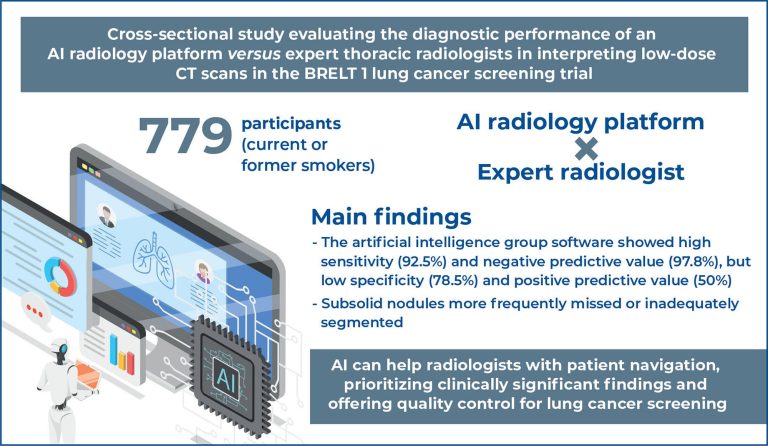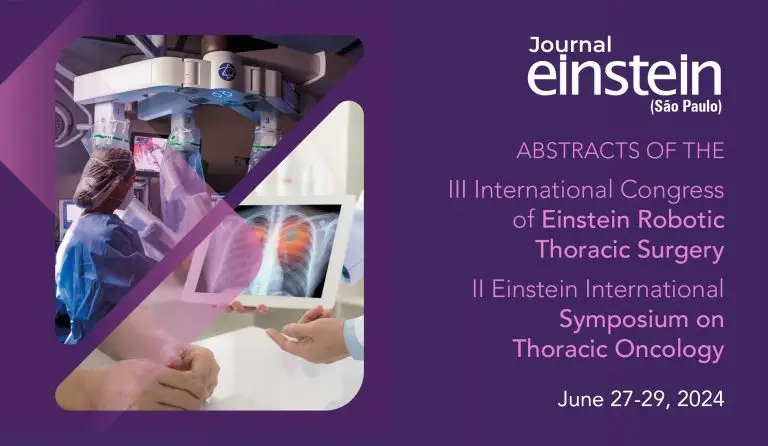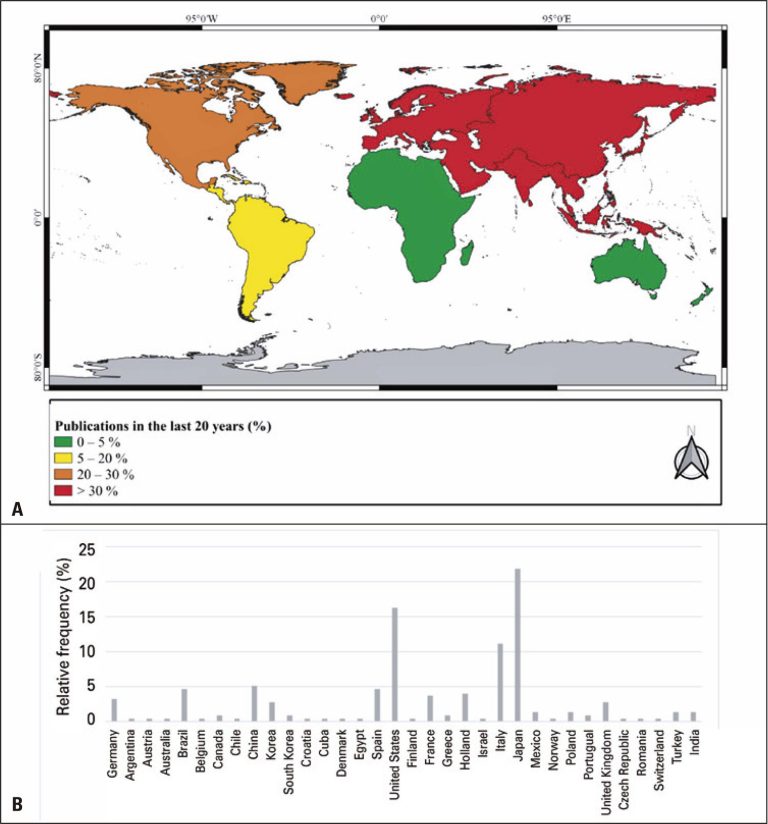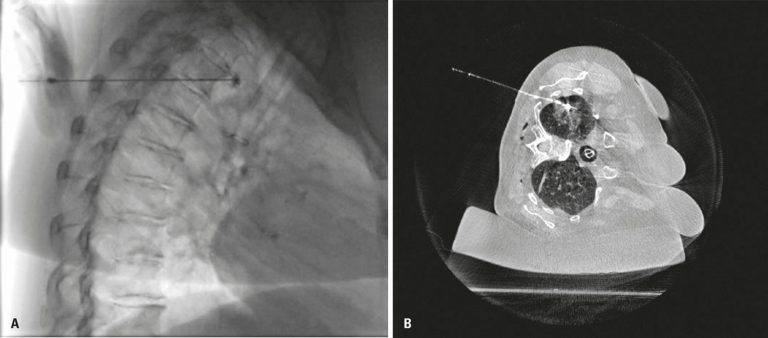10/nov/2025
Artificial intelligence in a Brazilian lung cancer screening program: accuracy and predictive values
DOI: 10.31744/einstein_journal/2025AO1283
Highlights ■ The artificial intelligence tool demonstrated high sensitivity (92.5%) and a negative predictive value of 97.8%. This effectively excluded examinations that were not clinically significant. ■ However, its low specificity (78.5%) and positive predictive value (50%) emphasize the importance of radiologist’s supervision. ■ – artificial intelligence missed 4.7% of nodules measuring >6mm, most of which were subsolid (62%). ■ The tool has the potential to improve workflows in lung cancer screening programs. ABSTRACT Objective: We aimed to investigate the […]
Palavras-chave: Inteligência artificial; Neoplasias do pulmão; Programas de rastreamento; Radiation dosage; Tomografia computadorizada por raios X
25/jun/2024
Comprehensive analysis: efficacy of pembrolizumab as an initial therapy for PD-L1 negative NSCLC
DOI: 10.31744/einstein_journal/2024ABS_BTS_STO010
Category: Thoracic Oncology Introduction: Bronchogenic tumors, predominantly non-small cell type (NSCLC), are a global health concern, with adenocarcinomas, their most common subtype, being most often diagnosed at advanced stages, making it essential to develop effective therapeutic strategies, especially for patients with NSCLC who do not express the PD-L1 (Programmed Death-Ligand 1) protein. Two pivotal studies, Keynote-189() and Keynote-407,() presented their combined results in 2023, after a 5-year follow-up,() concluding that the combination of Pembrolizumab and chemotherapy demonstrated substantial improvements in […]
Palavras-chave: Quimioterapia; Imunoterapia; Neoplasias do pulmão; Non-small-cell-lung; PD-L1 protein
25/jun/2024
Validation of thoracic surgery mortality prediction models in a contemporary database
DOI: 10.31744/einstein_journal/2024ABS_BTS_STO016
Category: Thoracic Surgery Introduction: Currently, surgical resection is considered the best treatment available for early-stage lung cancer. In recent decades, minimally invasive procedures have revolutionized thoracic surgery, expanding the benefited patient population by reducing morbidity and mortality rates, incidence of complications, length of hospital stay and postoperative pain.() However, lung resections remain associated with significant morbidity and mortality, with national studies indicating a complication rate of 21.8% and an in-hospital mortality rate of 1.8% for video- assisted surgeries.() Concomitantly, various […]
Palavras-chave: Neoplasias do pulmão; Postoperative mortality; Risk prediction; Cirurgia torácica
06/jun/2024
Prognostic value of programmed cell death ligand 1 (PD-L1) expression in patients with stage III non-small cell lung cancer under different treatment types: a retrospective study
einstein (São Paulo). 06/jun/2024;22:eAO0575.
Ver Artigo06/jun/2024
Prognostic value of programmed cell death ligand 1 (PD-L1) expression in patients with stage III non-small cell lung cancer under different treatment types: a retrospective study
DOI: 10.31744/einstein_journal/2024AO0575
Highlights PD-L1 expression by immunohistochemistry is positive in more than half on stage III non-small lung cancer. PD-L1 expression by immunohistochemistry had no relationship with clinical characteristics. PD-L1 expression by immunohistochemistry is not related to progression-free or overall survival in patients treated with chemoradiotherapy with or without surgery. ABSTRACT Objective: Currently programmed cell death protein 1 (PD-1) inhibitors in combination with other therapies are being evaluated to determine their efficacy in cancer treatment. However, the effect of PD-ligand (L) 1 […]
Palavras-chave: Adenocarcinoma; Carcinoma, non-small-cell lung cancer; Neoplasias do pulmão; Programmed cell death 1 receptor
13/out/2022
International trends in pulmonary neuroendocrine cancer studies:a scientometric study
DOI: 10.31744/einstein_journal/2022RW0113
ABSTRACT Introduction Pulmonary neuroendocrine tumors account for approximately 20% of all primary lung tumors. Few studies summarize the current body of pulmonary neuroendocrine tumors studies worldwide. Objective A quantitative scientometric analysis was conducted to evaluate the development of applications and innovations and to analyze their contribution to various areas of improvement in treatment and diagnosis of pulmonary neuroendocrine tumors. Methods We searched for studies published in the last 20 years in the databases United States National Library of Medicine (PubMed), […]
Palavras-chave: Neoplasias do pulmão; Neuroendocrine tumors; Scienciometry; Scientometric analysis
07/abr/2022
Lung nodule localization in hybrid room before minimally invasive thoracic surgery: series of 20 cases and literature review
einstein (São Paulo). 07/abr/2022;20:eAO6665.
Ver Artigo07/abr/2022
Lung nodule localization in hybrid room before minimally invasive thoracic surgery: series of 20 cases and literature review
DOI: 10.31744/einstein_journal/2022AO6665
ABSTRACT Objective To describe an experience in the preoperative localization of small pulmonary nodules and ground-glass lesions to guide minimally invasive thoracic surgery; in addition, a literature review was conducted, including the main advantages and disadvantages of the different agents used, and site marking in a hybrid operating room. Methods A retrospective search was conducted in a Interventional Radiology Department database, between March 2015 and May 2019, to identify patients undergoing preoperative percutaneous marking of lung injuries measuring up to […]
Palavras-chave: Neoplasias do pulmão; Período pré-operatório; Radiology, Interventional; Solitary pulmonary nodule; Thoracic surgery, video-assisted
18/nov/2014
Polimorfismos genéticos e carcinoma de pulmão de células não pequenas: os paradigmas do futuro
DOI: 10.1590/S1679-45082014RB2906
O presente artigo faz uma abordagem de questões atuais sobre os polimorfismos genéticos, que têm sido objeto de estudo translacional no contexto do carcinoma de pulmão de células não pequenas. Além disso, discute os novos potenciais biomarcadores de risco e prognóstico.
Palavras-chave: Marcadores biológicos de tumor; Neoplasias do pulmão; Polimorfismo genético; Prognóstico






